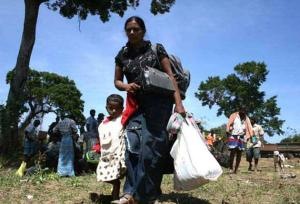 Dozens of Sri Lankan civilians are being killed and many more wounded every day even as the government moves to restrict foreign diplomats and journalists from what has been called a "war without witnesses".
Dozens of Sri Lankan civilians are being killed and many more wounded every day even as the government moves to restrict foreign diplomats and journalists from what has been called a "war without witnesses".
In the latest rebuff to international efforts to try to ease the suffering of up to 200,000 Tamil civilians, the Sri Lankan government yesterday rejected the appointment by Britain of a special envoy tasked with seeking an end to the fighting in the country’s north. A day earlier, Gordon Brown had appointed the former defence minister Des Browne to the role.
=====================================================================================
The battle zone: What can be done?
*What’s to be done about the Sri Lankan conflict?
The best hope is the United Nations. The Commonwealth has an Indian secretary general, Kamalesh Sharma, and the regional grouping of south-east Asian states, Asean, will rally round Sri Lanka. It would be difficult for President Rajapaksa to reject a mission by UN secretary general, Ban Ki-moon.
*Why did he reject a UK envoy?
The decision to appoint Des Browne was a gift from a former colonial power which failed to properly prepare his mission. The Sri Lankan government can now criticise Britain at a time when it has nothing to gain from allowing in a British envoy.
*What’s the government endgame?
Unlike his predecessor, President Rajapaksa is an arch Sinhalese nationalist who talks about the "final elimination of terror" from the northeast but appears to be bent on crushing the Tamil community as a whole.
=====================================================================================
"It is tantamount to an intrusion into Sri Lanka’s internal affairs and is disrespectful to the country’s statehood," said the Sri Lankan Foreign Minister, Rohitha Bogollagama, denying a claim by the British Foreign Office that talks on the appointment were still ongoing. "There could be major repercussions [for relations with Britain]," he said.
Aid groups have estimated that 200,000 civilians are trapped in a narrow strip of land, surrounded by fighting between Sri Lankan troops and the rebels of the Liberation Tigers of Tamil Eelam (LTTE). A senior health official in the region said gun battles and artillery fire between the two sides were killing about 40 civilians every day and wounding about 100 more.
Dr Thurairajah Varatharajah, the government health officer for the Mullaitivu district, told the Associated Press that artillery shells were persistently hitting civilian areas as well as a makeshift hospital he has been operating in a school in the coastal town of Putumattalan. "We are facing in the hospital big problems on all sides," he said. "Not enough toilets, bad water supply, food is also a problem."
The appointment of Mr Browne had been part of an effort by Britain to draw attention to the humanitarian issue in the conflict zone and to push for a ceasefire that would allow the evacuation of civilians – a request made by both Britain and the US and something the Sri Lankan government has so far rejected. "In this new role, [he] will focus on the immediate humanitarian situation in northern Sri Lanka and the government of Sri Lanka’s work to set out a political solution to bring about a lasting end to the conflict," the Prime Minister’s office had said in a statement.
Campaigners say the outside world has too little knowledge of what is happening in the war zone, where the army is seeking to crush the LTTE fighters who have been fighting for a separate homeland for Tamils for the past three decades. The rebels have routinely used suicide bombers and guerrilla tactics against a Sinhalese-dominated establishment they say has discriminated against the Tamils.
Journalists have been severely restricted from visiting the conflict zone and a number of British media organisations – including The Independent – have failed to secure visas to travel to Sri Lanka to cover the conflict despite repeated requests. Kapila Fonseka, a spokesman for the Sri Lankan high commission in London, said yesterday that officials routinely reported back to Colombo on journalists whose work was considered "unbalanced" but added: "Nobody has been banned. There is not a blockade against UK journalists. Sky is there, ITV is there and many are applying. Earlier the BBC was there."
Human rights activists say that, given the restrictions placed on the media and humanitarian workers, the ongoing conflict is all but hidden from public view. "The military zone has been effectively sealed off," said Yolanda Foster, of Amnesty International. "Civil society in Sri Lanka has been under siege given the curtailment of freedom of expression, the intimidation of editors and the detention of journalists. It’s a war without witnesses."
(For updates you can share with your friends, follow TNN on Facebook and Twitter )
